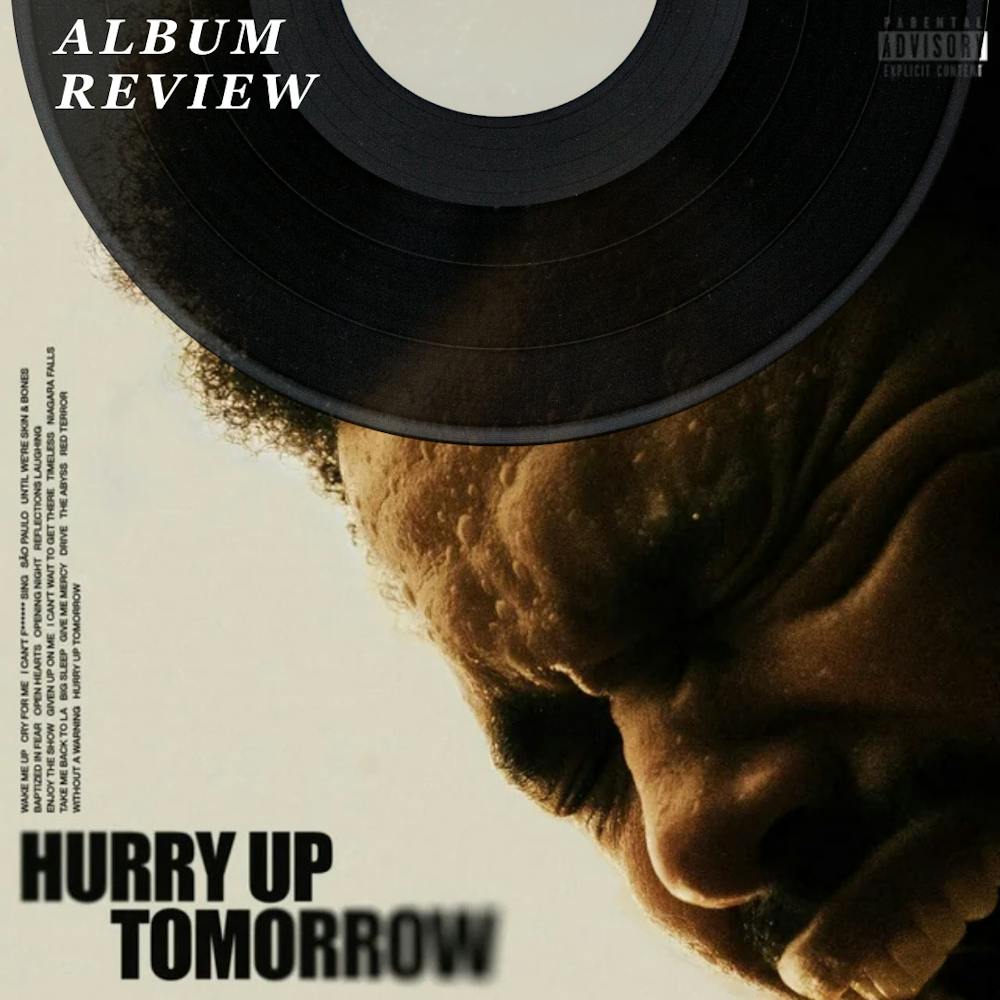A three-year music drought ended for fans of The Weeknd on Jan. 31 at midnight, when he dropped his sixth studio album, "Hurry Up Tomorrow." The four-time Grammy winner, whose legal name is Abel Tesfaye, included collaborations with Playboi Carti, Future, and Travis Scott on his highly-anticipated album." The 22-song tracklist includes a variety of genres and common motifs that The Weeknd often employs in his work. The album marks another stellar work from the star and sets a high bar for the 2025 release season.
The Canadian-born artist whose legal name is Abel Tesfaye drops “Hurry Up Tomorrow,” as the final installment of his “After Hours” (2020) trilogy, which is rumored to be his last album under his artist name. To close out the trilogy, the Weeknd invokes many themes from his previous songs, including substance use, religion and his relationship with his mother. The Weeknd’s stirring style persists, with emotional melodies mixed with upbeat ones, within the album as he traverses different genres to produce an exemplary series of tracks.
The album begins with the songs “Wake Me Up (feat. Justice)” and “Cry For Me,” the first of which is an initially slow song that switches to a more upbeat tune about halfway through and transitions excellently into the next track. The third track is a 12-second interlude that brilliantly transitions into a Brazilian funk song “São Paulo (feat. Anitta).” This song is an entirely new genre for The Weeknd and reflects the recent global popularization of the Brazilian style of music. Another short interlude follows this track, leading into a part of the album with some of its strongest songs.
“Baptized In Fear,” “Open Hearts” and “Reflections Laughing (feat. Travis Scott, Florence + The Machine” are all clear hits that feature many fascinating underlying themes. “Baptized in Fear” includes lines seemingly related to The Weeknd’s faith and potential religious guilt. Along with the title, lines such as “Like Paul, I’m the chief of sin” and “Washing my soul within, oh” allude to his Christian Orthodox upbringing. Along a different vein, “Open Hearts” is a powerful pop song that gives off the vibe of a fun night out downtown. It covers the vulnerabilities of falling in love, a theme The Weeknd is well-known for, thanks to hits like “Save Your Tears” (2020) and “Can’t Feel My Face” (2015).
“Reflections Laughing (feat. Travis Scott, Florence + The Machine) is a more somber tune, repeatedly mentioning the idea of “drowning” among other disheartening lines. The track includes a short recording of a phone call that warns the singer of falling victim to the music industry. After planning to boycott future Grammys in 2021 because of frustration with the selection process, the Weeknd could be referencing the pressures of being an artist in this day and age and his issues with the industry at large.
The album continues with songs containing some romantic themes, including “Enjoy The Show (feat. Future)” and “Given Up On Me” which have similar R&B vibes, imbuing them with a tranquil yet exciting energy. As the album moves into the back half, the first single from the album, “Timeless (feat Playboi Carti),” stands out. The track, which made its rounds on TikTok after its release in September, is already a fan favorite due to its ethereal intro and pristine beat drop. Another song to note is “Take Me Back To LA,” which details a past relationship using vivid imagery and his typically outstanding vocals. Its slow pace allows the Weeknd to show his range in a wonderful way, as he crafts a poignant story.
Songs 16 and 17, “Big Sleep (feat. Giorgio Moroder)” and “Give Me Mercy,” showcase different styles but both still contain some of the same religious motifs. “Big Sleep (feat. Giorgio Moroder)” is a slower song that transitions into a series of techno sounds about a third of the way through, whereas “Give Me Mercy” is a faster, more pop-like track that echoes The Weeknd’s classic beats, while still talking about faith, temptations, and mercy. “Big Sleep (feat. Giorgio Moroder)” mentions angels and includes a line saying, “Pray the Lord my soul to keep,” invoking sentiments of Christianity. This part of the album was a bit of a falloff from the earlier songs such as “Timeless (feat Playboi Carti)” and “Open Hearts,” which excellently set the tone. Nonetheless, I prefer “Give Me Mercy” out of these two tracks, due to its overall better flow and upbeat pace.
In the final five songs, the Weeknd sings more about love and relationships, and two of them stand out in particular. “The Abyss (feat. Lana Del Rey)” is the singer’s plea to a romantic partner, reminding them of their time together. The song’s slow beat signifies the artist’s anguish in the relationship and the “abyss” they find themself in. The final track of the album, “Hurry Up Tomorrow,” includes many of the aforementioned religious themes, as it begins with the lines “Wash me with your fire / Who else has to pay for my sins?” The track aptly concludes the album, as The Weeknd speaks often of its conclusion, such as in the line, “Now I’m ready for the end.”
“Hurry Up Tomorrow” is another fantastic album from The Weeknd. The singer returns to themes of religion, love, and mercy. However, he also adds a new perspective and includes new voices. Together with his collaborators, The Weeknd weaves a wonderful story within these 22 tracks.






